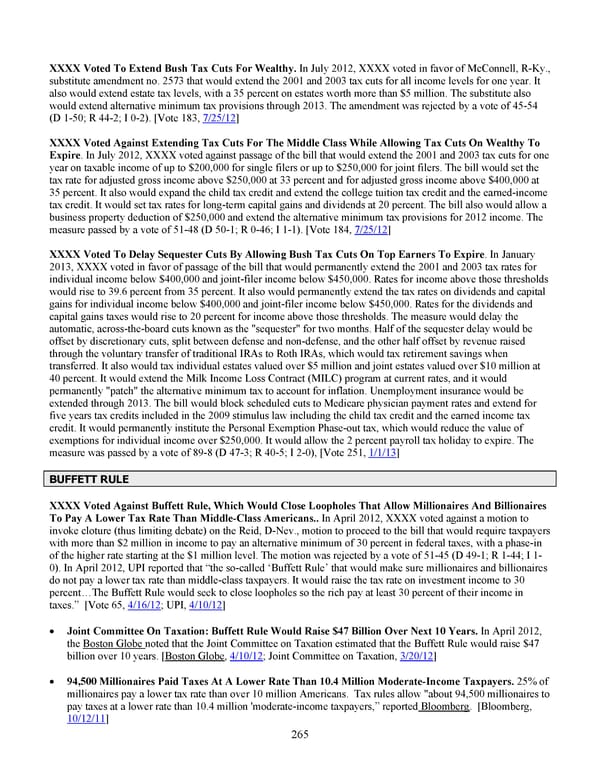XXXX Voted To Extend Bush Tax Cuts For Wealthy. In July 2012, XXXX voted in favor of McConnell, R-Ky., substitute amendment no. 2573 that would extend the 2001 and 2003 tax cuts for all income levels for one year. It also would extend estate tax levels, with a 35 percent on estates worth more than $5 million. The substitute also would extend alternative minimum tax provisions through 2013. The amendment was rejected by a vote of 45-54 (D 1-50; R 44-2; I 0-2). [Vote 183, 7/25/12] XXXX Voted Against Extending Tax Cuts For The Middle Class While Allowing Tax Cuts On Wealthy To Expire. In July 2012, XXXX voted against passage of the bill that would extend the 2001 and 2003 tax cuts for one year on taxable income of up to $200,000 for single filers or up to $250,000 for joint filers. The bill would set the tax rate for adjusted gross income above $250,000 at 33 percent and for adjusted gross income above $400,000 at 35 percent. It also would expand the child tax credit and extend the college tuition tax credit and the earned-income tax credit. It would set tax rates for long-term capital gains and dividends at 20 percent. The bill also would allow a business property deduction of $250,000 and extend the alternative minimum tax provisions for 2012 income. The measure passed by a vote of 51-48 (D 50-1; R 0-46; I 1-1). [Vote 184, 7/25/12] XXXX Voted To Delay Sequester Cuts By Allowing Bush Tax Cuts On Top Earners To Expire. In January 2013, XXXX voted in favor of passage of the bill that would permanently extend the 2001 and 2003 tax rates for individual income below $400,000 and joint-filer income below $450,000. Rates for income above those thresholds would rise to 39.6 percent from 35 percent. It also would permanently extend the tax rates on dividends and capital gains for individual income below $400,000 and joint-filer income below $450,000. Rates for the dividends and capital gains taxes would rise to 20 percent for income above those thresholds. The measure would delay the automatic, across-the-board cuts known as the "sequester" for two months. Half of the sequester delay would be offset by discretionary cuts, split between defense and non-defense, and the other half offset by revenue raised through the voluntary transfer of traditional IRAs to Roth IRAs, which would tax retirement savings when transferred. It also would tax individual estates valued over $5 million and joint estates valued over $10 million at 40 percent. It would extend the Milk Income Loss Contract (MILC) program at current rates, and it would permanently "patch" the alternative minimum tax to account for inflation. Unemployment insurance would be extended through 2013. The bill would block scheduled cuts to Medicare physician payment rates and extend for five years tax credits included in the 2009 stimulus law including the child tax credit and the earned income tax credit. It would permanently institute the Personal Exemption Phase-out tax, which would reduce the value of exemptions for individual income over $250,000. It would allow the 2 percent payroll tax holiday to expire. The measure was passed by a vote of 89-8 (D 47-3; R 40-5; I 2-0), [Vote 251, 1/1/13] BUFFETT RULE XXXX Voted Against Buffett Rule, Which Would Close Loopholes That Allow Millionaires And Billionaires To Pay A Lower Tax Rate Than Middle-Class Americans.. In April 2012, XXXX voted against a motion to invoke cloture (thus limiting debate) on the Reid, D-Nev., motion to proceed to the bill that would require taxpayers with more than $2 million in income to pay an alternative minimum of 30 percent in federal taxes, with a phase-in of the higher rate starting at the $1 million level. The motion was rejected by a vote of 51-45 (D 49-1; R 1-44; I 1- 0). In April 2012, UPI reported that “the so-called ‘Buffett Rule’ that would make sure millionaires and billionaires do not pay a lower tax rate than middle-class taxpayers. It would raise the tax rate on investment income to 30 percent…The Buffett Rule would seek to close loopholes so the rich pay at least 30 percent of their income in taxes.” [Vote 65, 4/16/12; UPI, 4/10/12] Joint Committee On Taxation: Buffett Rule Would Raise $47 Billion Over Next 10 Years. In April 2012, the Boston Globe noted that the Joint Committee on Taxation estimated that the Buffett Rule would raise $47 billion over 10 years. [Boston Globe, 4/10/12; Joint Committee on Taxation, 3/20/12] 94,500 Millionaires Paid Taxes At A Lower Rate Than 10.4 Million Moderate-Income Taxpayers. 25% of millionaires pay a lower tax rate than over 10 million Americans. Tax rules allow "about 94,500 millionaires to pay taxes at a lower rate than 10.4 million 'moderate-income taxpayers,” reported Bloomberg. [Bloomberg, 10/12/11] 265
 HRC vote skeleton Page 286 Page 288
HRC vote skeleton Page 286 Page 288